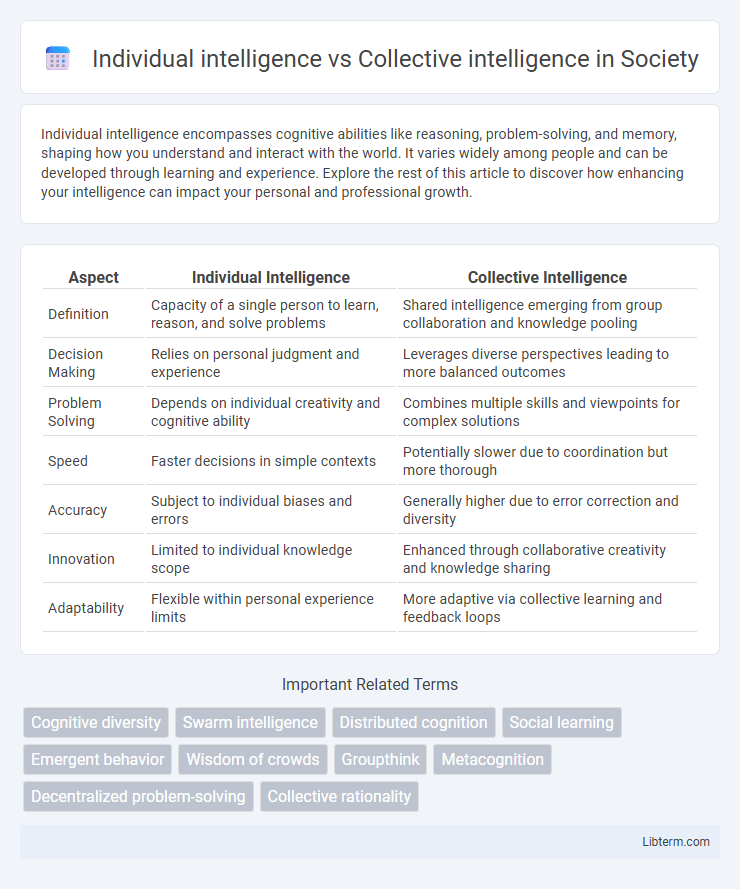Individual intelligence encompasses cognitive abilities like reasoning, problem-solving, and memory, shaping how you understand and interact with the world. It varies widely among people and can be developed through learning and experience. Explore the rest of this article to discover how enhancing your intelligence can impact your personal and professional growth.
Table of Comparison
| Aspect | Individual Intelligence | Collective Intelligence |
|---|---|---|
| Definition | Capacity of a single person to learn, reason, and solve problems | Shared intelligence emerging from group collaboration and knowledge pooling |
| Decision Making | Relies on personal judgment and experience | Leverages diverse perspectives leading to more balanced outcomes |
| Problem Solving | Depends on individual creativity and cognitive ability | Combines multiple skills and viewpoints for complex solutions |
| Speed | Faster decisions in simple contexts | Potentially slower due to coordination but more thorough |
| Accuracy | Subject to individual biases and errors | Generally higher due to error correction and diversity |
| Innovation | Limited to individual knowledge scope | Enhanced through collaborative creativity and knowledge sharing |
| Adaptability | Flexible within personal experience limits | More adaptive via collective learning and feedback loops |
Defining Individual Intelligence
Individual intelligence refers to the cognitive abilities and mental capacity of a single person, encompassing skills such as problem-solving, reasoning, memory, and learning. It is often measured by IQ tests and other standardized assessments that evaluate a person's intellectual potential and analytical thinking. Unlike collective intelligence, which emerges from group interactions and shared knowledge, individual intelligence centers on personal mental processes and intrinsic capabilities.
Understanding Collective Intelligence
Collective intelligence emerges from the collaboration and knowledge sharing among individuals, resulting in decision-making and problem-solving capabilities that surpass the sum of individual contributions. It thrives in diverse groups where varied perspectives and expertise converge, enhancing innovation and accuracy in complex tasks. Understanding collective intelligence involves analyzing communication patterns, social dynamics, and mechanisms like crowdsourcing and consensus-building to optimize group performance.
Key Differences Between Individual and Collective Intelligence
Individual intelligence refers to the cognitive abilities and problem-solving skills possessed by a single person, including reasoning, memory, and creativity. Collective intelligence emerges from the collaboration and shared knowledge of a group, leading to enhanced decision-making, innovation, and problem-solving beyond individual capabilities. Key differences include the scope of input, where individual intelligence relies solely on personal experience, while collective intelligence harnesses diverse perspectives and distributed expertise for more comprehensive solutions.
Advantages of Individual Intelligence
Individual intelligence allows for swift decision-making and creativity by leveraging unique personal experiences and cognitive abilities. It enables tailored problem-solving approaches, fostering innovation through deep focus and specialized knowledge. This form of intelligence is crucial for tasks requiring independent analysis and personal accountability.
Strengths of Collective Intelligence
Collective intelligence leverages diverse perspectives and expertise, enabling more accurate problem-solving and innovation compared to individual intelligence alone. The integration of multiple cognitive resources fosters enhanced decision-making processes and resilience against biases. Collaborative platforms and group dynamics amplify knowledge-sharing, leading to efficient solutions and adaptive outcomes in complex environments.
Limitations of Individual Intelligence
Individual intelligence is constrained by cognitive biases, limited memory capacity, and narrow perspectives, which can hinder problem-solving and decision-making. Human reasoning often suffers from information overload, reducing the ability to process complex data efficiently. Collective intelligence leverages diverse expertise and shared knowledge, overcoming these individual limitations to enhance accuracy and innovation.
Challenges in Harnessing Collective Intelligence
Harnessing collective intelligence faces challenges such as managing diverse perspectives that can lead to conflicts and decision paralysis, ensuring equal participation to avoid dominance by a few individuals, and integrating vast amounts of information into coherent and actionable insights. Overcoming biases, misinformation, and coordination difficulties within groups is critical to effectively leveraging collective cognitive resources. Effective communication tools and structured collaboration techniques are essential to mitigate these obstacles and enhance collective problem-solving capabilities.
Real-World Examples: Individual vs Collective Intelligence
Individual intelligence drives breakthroughs like Einstein's theory of relativity, showcasing the power of solitary genius in advancing physics. Collective intelligence shapes platforms such as Wikipedia and open-source software development, where collaboration harnesses diverse expertise to create comprehensive knowledge and innovative solutions. Real-world projects like the Human Genome Project reveal how collective intelligence accelerates complex scientific achievements beyond individual capabilities.
Application in Modern Organizations
Individual intelligence drives innovative problem-solving and specialized expertise within modern organizations, enabling quick decision-making and personal accountability. Collective intelligence aggregates diverse perspectives through collaboration platforms and knowledge-sharing systems, enhancing adaptability and strategic insight across teams. Organizations leveraging both harness individual creativity and group synergy to optimize performance and foster continuous innovation.
The Future of Intelligence: Integrating Individual and Collective Approaches
The future of intelligence hinges on integrating individual cognitive abilities with collective intelligence systems, leveraging advancements in artificial intelligence and networked collaboration platforms. Combining personal expertise and decision-making with real-time data aggregation and crowd-sourced insights enhances problem-solving efficiency across complex domains. This hybrid approach optimizes adaptive learning, innovation, and resilience in dynamic environments by balancing independent judgment with coordinated group intelligence.
Individual intelligence Infographic

 libterm.com
libterm.com